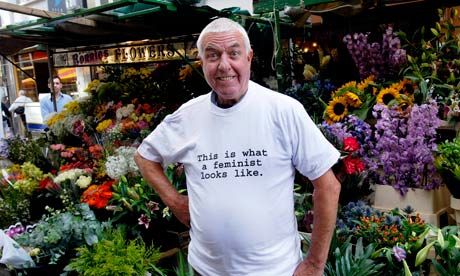Welcome to the fourth wave of feminism. This movement follows the first-wave campaign for votes for women, which reached its height 100 years ago, the second wave women's liberation movement that blazed through the 1970s and 80s, and the third wave declared by Rebecca Walker, Alice Walker's daughter, and others, in the early 1990s. That shift from second to third wave took many important forms, but often felt broadly generational, with women defining their work as distinct from their mothers'. What's happening now feels like something new again. It's defined by technology: tools that are allowing women to build a strong, popular, reactive movement online. (Cochrane, K. 2013b).
|
0 Comments
Asked how she can justify exploiting the very sexual objectification she's protesting against, she says, "I'm not against my body. I'm against their point of view on my body. We are giving you meaning to women's body. We're showing it in a completely different context, with completely different emotion – not with this," and she poses like a glamour model. (Aitkenhead, 2013).
slut is a grubby little insult and I want no part of it. Ugh, slut is used to pass judgment on women's desires, their social life, the tightness of fabric around their bum, (Heawood, 2013c). Many of the Mumsnet feminists I talked to said they had always been "feminists" but not "academic" ones – as if a discussion of intersectionality and gender theory were the real ways to define themselves as believing in equality, rather than the way they chose to live their lives. (Martinson, 2013b). "They created the character because they felt Superman represented a kind of blood-curdling masculinity. They wanted to introduce somebody more feminine." (Morrison in Sneddon, 2013) But somehow men leave the heavy lifting against gender bias and gender hatred to women. The most charitable explanation is that men worry they cannot speak about this subject authentically, that their perspective is of less value than a woman's. Others fret they'll get it wrong, that they'll inadvertently say something that is itself sexist, thereby revealing that they too don't "get it" – so it's safer to say nothing. The diffidence of the men who took part in last week's #twittersilence was striking, several indicating that they were only "sort of" taking part. ‘Catherine Bennett – CB to her fans – is a dinosaur-loving, bike-riding, tuna pasta-eating hero who squeezes in a pop career around working in a museum as a palaeontologist. As Taylor explains, it was important to make CB “very different” to the female celebrities children usually see. Where most stars straighten their hair, CB wears hers defiantly curly. While other singers opt to bare their flesh, CB’s skirts are kept firmly below the knee.’ (Love, 2013). ('I will not be lectured on sexism and misogyny by this man, I will not. Because if he wants to know what misogyny looks like in modern Australia, he doesn't need a motion in the House of Representatives, he needs a mirror.') Two things are unarguable about this century; the first is that it is more sexist than the end of the last, raunch and postmodernism having converged to normalise the presentation of women as meat; the second is that the internet has had profound consequences for privacy and, inevitably, personal freedom. But pause to consider the vivacity of the feminist fourth wave, its energy and victories, the way it has honed and deployed the power of social media rather than surrendered to the misogynist tropes it throws up. It is fearless and pugnacious and alive with a sense of possibility. (Williams, 2013b). |
AuthorWrite something about yourself. No need to be fancy, just an overview. Archives
December 2013
Categories
All
|




 RSS Feed
RSS Feed
